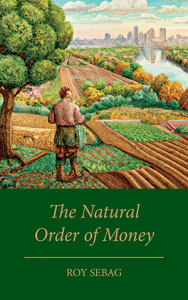The Natural Order of Money

Author: Roy Sebag
Publisher: Goldmoney Publishing
Year of Publication: 2022
Print Length: 100 pages
Genre: Non-Fiction / Philosophy, Social Science
Topic: Capitalism, Ecology & Climate, Economy, Nature, Politics & Power, Eating & Drinking
The Natural Order of Money is about the intrinsic relationship between people, money, and nature. The book begins by asking a simple question: Why do we in our modern society expect food as if it were a given? What initially makes cooperation between the farmer and other members of society possible, and what, in the long run, renders it sustainable? The proposed solution affirms the vital importance of the farmer and the food that he harvests and argues that only a natural money can serve as the concrete means of assuring ecological accountability and sustainable prosperity. In a time of uncertainty plagued by wealth inequality, inflation, and environmental stress, The Natural Order of Money pierces the fog of financial elitism and re-establishes society in our shared home of nature. It equips the reader with a compass to again find True North in a sea of economic confusion.
The Natural Order of Money is written to be accessible to any reader while also engaging experts in the realm of social science. The book presents a novel, philosophical account of money and its connection to the natural world. Its theory of ‘ecological accountability’ will interest those who are critical of modern capitalism, and those who are environmentally conscious and seek an economic theory which prioritizes sustainability. The arguments in the book offer a challenge to current political ideas on the right and left. Although written to be timeless, the book touches on many topics (such as inflation, wealth inequality, and unsustainable economic policy) that have recently come to dominate economic and political discourse.
Table of Contents
Author’s Preface
THE NATURAL ORDER OF MONEY
1. What makes cooperation possible and sustainable between people and the natural world?—We must turn to the natural order—Modern economic theory deals with analysis in a mathematical vacuum, removed from its wider ecological environment—This work is an exercise in natural philosophy that is occupied with the synthesis of the living, breathing economy.
2. Time is the fundamental, superseding law of nature—Time moves forward and is irreversible—Human action is beholden to the requirements of the present—Contemporary economics tends to ignore the condition of our temporality—The essential features of nature emerge within the omnipresent theatre of time.
3. Nature is a thermodynamic system governed by the forces of energy and entropy—Metabolization is the process of conserving and expending energy—Energy sources which propel this thermodynamic system are foods, fuels, and elemental substances.
4. The human cooperative system is also thermodynamic—There is a chain of temporal energy dependency, in which the first cause of an economy is those who work with nature to source foods, fuels, and elemental substances—The real economy only consumes them—The perfect cycle of the farmer’s activity—The real economy is beholden to a natural standard of measure and reward.
5. Ecological accountability is a fact of nature and of all human cooperative systems—Only the service economy is able to artificially and temporarily ignore ecological accountability—When ecological accountability is manipulated or forgotten, the relationship between real and service economies becomes parasitic—The natural standard must be reified and extended to all members ensuring that ecological accountability remains at the heart of cooperation.
6. Ecological accountability is not an ideal or promised, but a lived reality—Money extends the natural standard, promoting cooperation while reflecting ecological accountability—Money itself must be an energy embodiment—Money is more than its incidental features—This understanding of money differs from standard accounts in modern economic and anthropological theory.
7. A superior money will be resistant to entropy and rare or difficult to extract from nature—True money will neither be food nor fuel, but rather an elemental substance—Elements are naturally scarce, meaning that each element exhibits certain unchanging qualities—Gold is the apex element within the natural order of money.
8. When money is gold, cooperation between people and nature is sustainable—Gold money remains a stable measure and reward in both generative and degenerative cycles—We live in an age of contrived moneys and parasitic economies—A solution must be given by nature and not the service economy—Gold is the perfect mirror of ecological accountability.
Appendix I
Appendix II
Notes

Roy Sebag is an Israeli-Canadian investor, author and entrepreneur. Born to third generation farmers, Roy Sebag is an entrepreneur with nearly 20 years of experience in the mining, investment management, agriculture, technology, and manufacturing industries. He has become an independent voice and author in the fields of economics and natural philosophy.
Source: https://www.goodreads.com/en/book/show/123224169
More from Roy Sebag in this library, click here.
